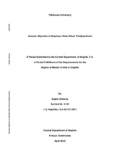Please use this identifier to cite or link to this item:
https://elibrary.tucl.edu.np/handle/123456789/3205| Title: | Somatic Abjection in Nepalese Hindu Ritual Rishi panchami |
| Authors: | Acharya, Sujata |
| Keywords: | Rishipanchami;somatic abjection;Nepalese Hindu women |
| Issue Date: | 2019 |
| Publisher: | Central Department of English |
| Abstract: | The purpose of this study is to understand why Nepalese Hindu women experience somatic abjection in the ritual Rishipanchami.This ritual regards that Hindu women are trained to develop a certain type of bodily gestures, mode of thoughts and faiths in order to serve the existing patriarchal values. To explain this issue further, this research has made a close study of Rishipanchami that usually falls in September. This is a contextual study of one of the most celebrated Nepalese Hindu ritual called “Rishipanchami” from the perspective of feminist theories mainly formulated by Julia Kristeva and Helen Cixous. Ritual scholars like Catherine Bell and Victor Turner’s ideas regarding ritual and human behavior are also explained. It uses Dinanath Pandit’s bookHaritalika tatha Rishipanchami Poojabidhiand its performances as research materials. Rishipanchami is the last day cultural ritual of the festival ‘Teej’ in Nepalese Hindu society. A female celebrates ‘Teej’ after she enters into her puberty. It is a part of the women’s festival and it creates bodily abjection for women themselves. Rishipanchami is conducted for the purification of the female body on the basis of religious myth which regards menstruation as a curse. This research paper affirms that this religious ritual is not merely a ritual practiced for purifying female’s body but it is a portrayal of bodily humiliation that Nepalese Hindu women are asked to perform to support existing patriarchal values. Key words: Rishipanchami, somatic abjection, patriarchy, Nepalese Hindu women |
| URI: | http://elibrary.tucl.edu.np/handle/123456789/3205 |
| Appears in Collections: | English |
Files in This Item:
| File | Description | Size | Format | |
|---|---|---|---|---|
| THESIS.pdf | 187.28 kB | Adobe PDF |  View/Open |
Items in DSpace are protected by copyright, with all rights reserved, unless otherwise indicated.
